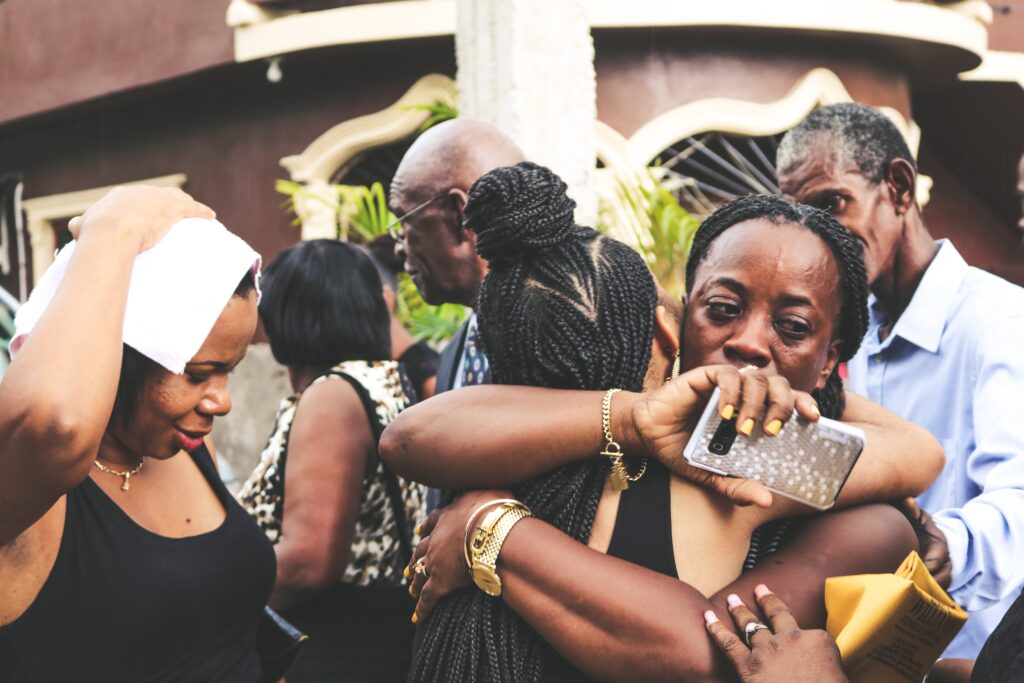The journey of grief
Grief is personal and individual, and every person experiences its nuances differently. Your personality, your support system, your natural coping mechanisms and many other things will determine how loss will affect you. There are no rules, no timetables, and no linear progression. Some people feel better after a few weeks or months, and for others it may take years. And in the midst of recovery there may be setbacks — this nonlinear process can’t be controlled. It’s critical that you treat yourself with patience and compassion and allow the process to unfold.
Below you’ll find some insights into the stages and symptoms of grief. We’ve also collected some advice from professionals about how to best get through the grieving process. We hope that the following information will help you reach a place in your process where, in spite of your grief, you are better able to function and live on a daily basis.

Grief is often described in stages, though each stage may last for a different period of time — for some people, the stages may be briefer or longer than for others, and some people may not experience all of them. But acknowledging that you may experience some or all of these stages will help you understand what may be happening. And you should not pass judgment on yourself or allow others to — you have the right to grieve and to fully experience your grief. Your feelings are normal, and it’s important to remember that at some point, it will get better. You may not get over your loss, but you will survive it. The five general stages of grief are listed below
Denial: This can’t be happening.
Anger: Why did this happen? Who is to blame?
Bargaining: Make this not happen and I will…
Depression: I can’t bear this; I’m too sad to do anything.
Acceptance: I acknowledge that this has happened, and I cannot change it.
While the five stages of grief may appear to be steps in a process, they are not. Even Kübler-Ross said that the stages are not meant to neatly package up grief — there is no typical loss and no typical grief. Grieving is as individual as we are and is not a linier process.
Grief indicators, the common signs and symptoms of grief
Shock and disbelief: It’s hard to accept a death. You may feel numb and question whether the loss really happened — this isn’t unusual. Some have noted their initial reluctance to even notify others of a loss in case it turned out to be untrue. This is a normal reaction, as is still expecting someone to call or write or show up, even if intellectually you have accepted their death.
Sadness: Profound sadness is a universal experience, and can often lead to a feeling of aloneness or isolation. We sometimes believe that no one can understand the depth of our grief, which drives us deeper into sorrow.
Anger: Regardless of how someone we loved died, anger often comes into play. You may be angry with the person for not being here anymore, or with caregivers for not doing more. You may blame God or others. Or you may not be able to direct your anger against a specific source, but find that everyday, small injustices seem much bigger than they might have in the past. This is normal, and no one should tell you that you have to stop or let go of your anger — that will happen eventually as part of your process, on your own timeline.
Fear: A loss can trigger fear on many levels — fear of your own mortality, of losing those you love, of facing life without the person who has died. It can include fear of the future and the uncertainty you may now feel about your life’s plans, knowing that someone close to you has died.
Physical pain: We often think of grief as emotional, but it can manifest physically as well. Symptoms can include nausea, fatigue, lowered immunity, weight loss or gain, insomnia, aches and pains and more. Although it can be quite difficult, it’s important to do what you can to maintain your health during grief.
Finding grief support
One of the critical factors in healing from grief is the support of other people. Having support from your family, friends, or a community of others who have also experienced grief allows you to feel that someone else “gets it.” Being able to share your story or your feelings is vital to the healing process. Places you may find grief support:
Faith-based groups: If you are religious, you may find support in your community or with the leader of your church or temple. They may be able to provide suggestions for rituals or prayer that can help. Because of their role in the community, they may have extensive experience with loss.
Support groups: There are many types of support groups for both general and specific types of loss. If this feels intimidating, remember that you can attend a group and just listen. You won’t be forced to speak until you’re comfortable, and you may draw comfort from being in a community of others who have some understanding of the depth of your grief. You can find local support groups on HealGrief.org.
Therapists or counselors: Sometimes, talking to a professional with experience in grief counseling can help you work through some of the intense emotions you may be feeling. It’s normal to feel vulnerable during grief, and you might not always want to share your thoughts with the people in your daily life. A compassionate third party who has grief experience may help you overcome obstacles to your healing. You can find more resources here.
Community: You may be a private person or not have a local network of support.




